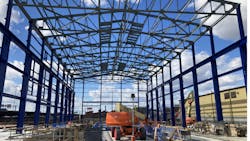MDOT MTA 10-year plan addresses 98 percent of State of Good Repair transit needs
The updated Capital Needs Inventory (CNI) and Prioritization Report was released by the Maryland Department of Transportation Maryland Transit Administration (MDOT MTA), detailing the agency’s need to address more than $6.3 billion in capital costs over the next 10 years.
The report, covering 2022 to 2031, highlights MDOT MTA’s progress in reducing a State of Good Repair backlog from 16.2 percent of all assets to 14.4 percent over the past three years. Expected levels of state and federal funding will reduce that number to 5.4 percent by 2027 and 1.3 percent by 2031 – meeting 98 percent of needs. The full report is available on the MDOT MTA website.
“MDOT MTA has prioritized State of Good Repair investments over the past several years, and we’re now seeing those results,” said MDOT MTA Administrator Holly Arnold. “Our continued investments will result in fewer maintenance-related interruptions to operations and improved reliability for our riders.”
MDOT MTA operates and maintains $12.6 billion in assets to provide transportation services throughout Maryland. Total needs have increased due to inflation, the cost of zero-emission buses (ZEBs), garage modernization for ZEB charging/fueling, light-rail vehicle replacements and aging rail systems. Yet while 10-year funding needs increased by $600 million since 2019, the funding gap has decreased by more than $1.1 billion due to historic levels of investment.
Recent MDOT MTA projects have included replacement of Camden Station, the Kirk Bus Garage modernization, replacement of multiple Metro Subway interlockings, rehabilitation of light-rail track and interlockings and ongoing construction of a heavy maintenance building for MARC Train locomotives at Riverside Yard.
In addition, items planned for funding in the MDOT MTA Consolidated Transportation Program (CTP) between 2022 and 2031 include:
- Bus replacements ($1.1 billion, including zero-emission vehicles beginning in 2025);
- Metro SubwayLink railcar replacements ($332 million);
- MARC Train locomotive and railcar overhauls and replacements ($315 million);
- MARC Train track and guideway ($404 million);
- Metro SubwayLink and Light RailLink guideway ($300 million);
- Metro SubwayLink station upgrades ($236 million); and
- Elevator and escalator overhauls ($185 million).
A backlog of State of Good Repair preservation efforts can impact transit performance if left unaddressed, affecting reliability and service quality, although it does not indicate assets that are unsafe to operate. The MDOT MTA transit asset management program monitors the condition of its assets and applies lifecycle management strategies to support full performance.
MDOT MTA says it will continue to pursue discretionary funding to further close the funding gap and address additional enhancement and expansion needs.
